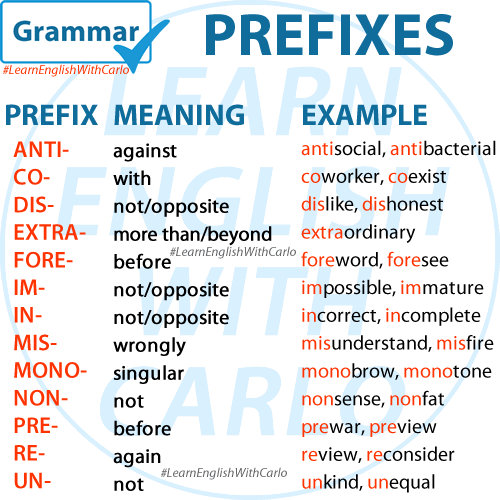Have you ever wondered how a single word can convey vastly different meanings, just by adding a few letters at the beginning? Enter the fascinating world of prefixes – those tiny yet mighty linguistic tools that shape our language in profound ways.
What are Prefixes?
At their core, prefixes are linguistic building blocks, morphemes attached to the beginning of words to alter their meanings. They serve as the gateway to a universe of nuanced expressions, drawing from a rich tapestry of languages, including Latin, Greek, and Old English.
Common Prefixes and Examples
- Un-
- Meaning: Not, opposite of.
- Examples: Unhappy, undo, unclear.
- Re-
- Meaning: Again, back.
- Examples: Rewrite, return, redo.
- Pre-
- Meaning: Before.
- Examples: Preview, prehistoric, preheat.
- Dis-
- Meaning: Not, opposite of, reverse action.
- Examples: Disagree, dislike, disconnect.
- Mis-
- Meaning: Wrongly, badly.
- Examples: Misunderstand, misinterpret, misinform.
- In-/Im-/Il-/Ir-
- Meaning: Not, opposite of.
- Examples: Impossible, illegal, irregular, irresponsible.
- Sub-
- Meaning: Under, below.
- Examples: Submarine, substandard, submerge.
- Trans-
- Meaning: Across, beyond, through.
- Examples: Transport, transmit, transform.
- Ex-/E-/Ef-
- Meaning: Out, from, former.
- Examples: Exit, extract, evolve.
- Co-/Con-/Com-/Col-
- Meaning: With, together.
- Examples: Collaborate, connect, coexist.

Usage Tips
Understanding prefixes is not just about memorizing a list; it’s about wielding them effectively. Here are some tips to master their usage:
- Pay attention to spelling changes: Sometimes, adding a prefix alters the spelling of the word itself (e.g., “in-” becomes “il-” before certain letters).
- Consult dictionaries: When in doubt, consult reputable dictionaries to ensure accurate prefix usage.
Benefits of Understanding Prefixes
Embracing prefixes isn’t merely an exercise in linguistic curiosity; it’s a gateway to linguistic empowerment. Here’s why:
- Enhanced vocabulary comprehension: Knowing prefixes expands your vocabulary arsenal, enabling you to decipher complex words with ease.
- Decoding unfamiliar words: When encountering unfamiliar terms, recognizing their prefixes can provide valuable clues to their meanings.
- Building word families: Understanding prefixes allows you to trace the etymology of words and establish connections within word families, fostering a deeper appreciation for language dynamics.
Conclusion
In the vast tapestry of language, prefixes are the humble architects of meaning, imbuing words with depth and versatility. By unraveling their mysteries, we unlock a treasure trove of linguistic possibilities. So, let’s embark on this journey of linguistic discovery, one prefix at a time.
